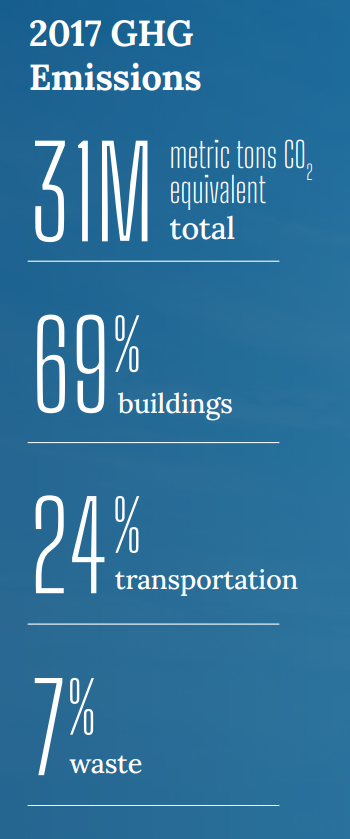Electrify Chicago
An independent tool for viewing City of Chicago building data
According to the
2022 Chicago Climate Action Plan,
69% of Chicago's emissions come from buildings, making
building emissions our biggest challenge and our biggest opportunity as a city
to tackle climate change. At Electrify Chicago, we showcase building performance using
publicly available data supplemented by community-submitted photographs and building
owners.
Start by looking at Chicago's buildings with the highest greenhouse gas intensity i.e. emissions per square foot. Large, efficient, buildings can perform much better than very inefficient small buildings on this metric.
New Article
📰 $30 Million In Missed Fines
The City Of Chicago failed to collect $30 million in potential fines from the building benchmarking ordinance, reducing transparency and accountability.
Legislative update! 🎉
As of late January 2024, legislation is being introduced to require new use more efficient forms of water and space heating, via the Clean And Affordable Buildings Ordinance (CABO), which will reduce the number of highly polluting and inefficient buildings that end up on this site.
If you're in Chicago,
write to your alderman to support the CABO!
Chicago Buildings by Greenhouse Gas Intensity
Note: Data includes large Chicago buildings with data from 2022, unless explicitly stated otherwise.
Note: This data only includes buildings whose emissions are reported
under the
Chicago Energy Benchmarking Ordinance. According to the City “As of 2016,
this list includes all commercial, institutional, and residential buildings larger than
50,000 square feet.” This dataset is also then filtered to only buildings with
reported emissions > 1,000 metric tons CO2 equivalent.
The latest year of data is from 2022, but we update the site regularly when new data is available, and some buildings may have failed to report that year, and only have older data available.
| Property Name / address | Primary Property Type |
Greenhouse Gas Intensity (kg CO2 eq./sqft) |
Total Greenhouse Emissions (metric tons CO2 eq.) |
|---|---|---|---|
|
550 W. Fulton Condominium Association
550 W Fulton
| Multifamily Housing | 4.7 kg/sqft
Lowest 20%
| 302 tons
Lowest 9%
|
|
Palmer Square Apts (2 of 6)
2128-40 N Kedzie
| Multifamily Housing | 4.7 kg/sqft
Lowest 20%
| 1,001 tons
Highest 45%
|
|
Smyser -CPS
(CPS)
4310 N Melvina Ave
| K-12 School | 4.7 kg/sqft
Lowest 20%
| 527 tons
Lowest 29%
|
|
Edwards Elementary -CPS
(CPS)
4815 S Karlov Ave
| K-12 School | 4.7 kg/sqft
Lowest 20%
| 822 tons
Lowest 47%
|
|
Belding Elementary, Hiram H - CPS
🏆
(CPS)
4257 N Tripp Ave
| K-12 School | 4.7 kg/sqft
Lowest 20%
| 329 tons
Lowest 11%
|
|
Alcott Elementary, Louisa May -CPS
(CPS)
2625 N Orchard St
| K-12 School | 4.7 kg/sqft
Lowest 20%
| 395 tons
Lowest 16%
|
|
Park Lincoln by Reside
2470 N Clark St
| Multifamily Housing | 4.7 kg/sqft
Lowest 20%
| 699 tons
Lowest 40%
|
|
Lathrop Homes
(CHA)
2000 W Diversey Ave
| Multifamily Housing | 4.7 kg/sqft
Lowest 20%
| 2,313 tons
Highest 19%
|
|
Steinmetz Academic Center HS -CPS
(CPS)
3030 N Mobile Ave
| K-12 School | 4.7 kg/sqft
Lowest 20%
| 1,859 tons
Highest 25%
|
|
Calumet Park
🕰️
9801 S Avenue G
| Other - Recreation | 4.7 kg/sqft | 271 tons |
|
50 East Bellevue Condo Association
50 E Bellevue Pl
| Multifamily Housing | 4.7 kg/sqft
Lowest 20%
| 1,125 tons
Highest 41%
|
|
933 Van Buren Condominium Association
933 W Van Buren St
| Multifamily Housing | 4.7 kg/sqft
Lowest 20%
| 1,401 tons
Highest 34%
|
|
1250 N Dearborn Condominium Association
1250 N DEARBORN ST
| Multifamily Housing | 4.7 kg/sqft
Lowest 20%
| 927 tons
Highest 48%
|
|
4300 N MARINE DR
4300 N MARINE DR
| Multifamily Housing | 4.7 kg/sqft
Lowest 20%
| 917 tons
Highest 48%
|
|
3240 N LAKE SHORE DR
3240 N LAKE SHORE DR
| Multifamily Housing | 4.7 kg/sqft
Lowest 20%
| 1,196 tons
Highest 39%
|
Data Source:
Chicago Energy Benchmarking Data
